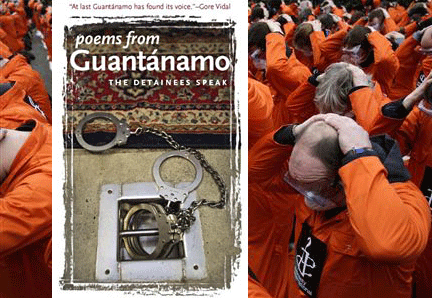
Since 2002, at least 775 men have been held in the U.S. detention center at Guantánamo Bay, Cuba. According to Department of Defense data, fewer than half of them are accused of committing any hostile act against the United States or its allies. In hundreds of cases, even the circumstances of their initial detainment are questionable. Poems from Guantánamo: The Detainees Speak (The University of Iowa Press, 2007) conveys the voices of men held at Guantánamo. Available only because of the tireless efforts of pro bono attorneys who submitted each line to Pentagon scrutiny, Poems from Guantánamo brings together twenty-two poems by seventeen detainees, most still at Guantánamo, in legal limbo. The collection is edited by Marc Falkoff, who has worked on behalf of many detainees from Yemen, and contains a preface by Flagg Miller, an anthropologist and professor of religious studies at the University of California, Davis. Miller’s essay combines an overview of Muslim prison poetry throughout history to an analysis of the poems in the collection, and is entitled “Forms of Suffering in Muslim Prison Poetry.” An afterward is written by Ariel Dorfman, a Chilean American poet, novelist, and human rights activist who teaches at Duke University.
Adrian Rich writes about the collection: “Poems from Guantánamo brings to light figures of concrete, individual humanity, against the fabric of cruelty woven by the ‘war on terror.’ The poems and poets’ biographies reveal one dimension of this officially obscured narrative, from the perspective of the sufferers; the legal and literary essays provide the context which has produced—under atrocious circumstances—a poetics of human dignity.â€
Gore Vidal writes “At last Guantánamo has found its voice.â€
Among the poems is the following:
Is it true that the grass grows again after rain?
Is it true that the flowers will rise up again in the Spring?
Is it true that birds will migrate home again?
Is it true that the salmon swim back up their streams?
It is true. This is true. These are all miracles.
But is it true that one day we’ll leave Guantanamo Bay?
Is it true that one day we’ll go back to our homes?
I sail in my dreams. I am dreaming of home.
To be with my children, each one part of me;
To be with my wife and the ones that I love;
To be with my parents, my world’s tenderest hearts.
I dream to be home, to be free from this cage.
But do you hear me, oh Judge, do you hear me at all?
We are innocent, here, we’ve committed no crime.
Set me free, set us free, if anywhere still
Justice and compassion remain in this world!
— Osama Abu Kabir